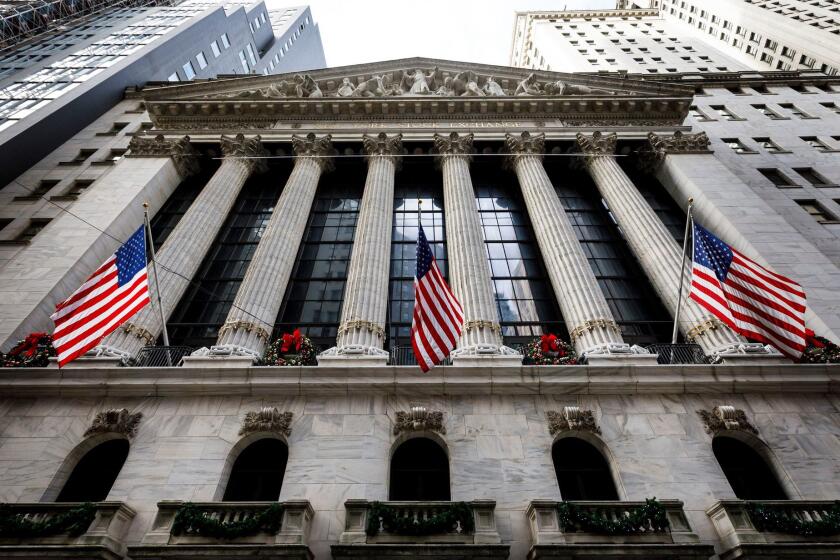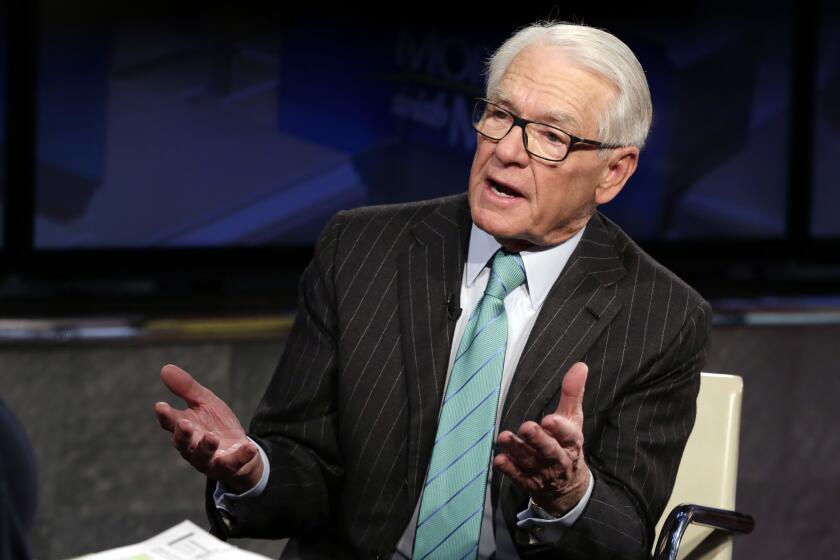Is Vanguard getting too big to be healthy for the financial system?
- Share via
Malvern, Penn., is quintessential small-town America: verdant, quiet and lined with 19th century streetlamps. But just outside town lies the sprawling campus of Vanguard, a massive asset manager that is reshaping the sleepy town and the surrounding area.
“It’s definitely had a major economic impact,” says Christopher Bashore, the borough manager. Indeed, one local hotelier estimates that over half of his guests — a mix of financial advisors, consultants and clients from pension funds — come because of the investment group, which is based in nearby East Whiteland Township.
Once an upstart investment company shunned — even mocked — by rivals, Vanguard has disrupted the investment management world. The cheap index-tracking funds championed by late founder John Bogle helped batter down fees across the industry and have attracted $10 trillion of assets. The company is now cautiously expanding in Europe, China and elsewhere, moving deeper into financial advice, and even exploring whether it could offer its customers private equity funds.
“The sheer size of Vanguard and the income that it generates allows us to invest more for our clients, roll out things like advice, enter new markets,” Tim Buckley, Vanguard’s chief executive, said in an interview. “Our size gives us the ability to do it while still lowering your costs to improve your returns.”
The 2008 financial crisis hit during millennials’ formative years — creating habits and fears that have kept many away from 2019’s stock market gains.
Disruption, however, ruffles feathers. Moving further into offering financial advice, it competes with wealth managers and financial advisors who offer Vanguard products.
International expansion also takes it into less hospitable terrain. There are concerns that the inexorable tide of “passive” funds — which track a stock or bond index, as opposed to “active” investment picks designed to beat the market — are distorting markets and weakening corporate governance.
And although Vanguard’s success has been a boon to millions of retail investors, there is mounting nervousness over its sheer size — something even Bogle, who died a year ago, acknowledged.
So far, those worries have mostly manifested themselves in small technology glitches that have annoyed its clients — most recently at the end of 2019, when its website seized up with customers trying to reshuffle their portfolios. Yet the bigger concern is that its deepening control over the stock market could at some point become unhealthy.
“If just a few asset managers in practice control most companies, that’s not how capitalism should work,” says Martin Schmalz, a professor of finance at Oxford. “The question is when that threshold is reached. I don’t know if it has, but we have to think about this now.”
This issue is not specific to Vanguard. But the investment group is swelling at a dramatic pace, thanks to one crucial advantage over its rivals: It is owned by its own funds, allowing it to use profits after covering costs and business investments to lower its fees, rather than reward outside shareholders with dividends and buybacks.
In other words, the more it grows, the cheaper its funds can become, in turn generating more growth — a virtuous cycle that has helped Vanguard more than treble in size since 2011. It is particularly dominant in the U.S., where last year it took in more money than its two biggest rivals, BlackRock and Fidelity, combined, according to Morningstar.
Vanguard today accounts for over a quarter of the entire U.S. mutual-fund market — a market share almost as big as Fidelity, BlackRock and Capital Group put together — and it is one of the biggest shareholders in virtually every major listed U.S. company.
Rarely, if ever, has one firm dominated the investment industry so extensively, said Alec Lucas, a Morningstar analyst.
“Vanguard is getting into unprecedented territory,” he said. “Their growth is something that bears monitoring.” The question is whether it might at some point become so large that its influence over corporate America stirs interest among politicians, regulators and activists.
For retirees with little in the bank, it’s possible to suspend Social Security benefits and go back to work. Hire a planner to figure out your options.
Gerry O’Reilly may not be a household name, but he is the world’s biggest fund manager. He is also one of the best-performing ones, despite eschewing traditional industry analysis, powwows with executives or poring through securities filings.
A former track runner — he represented Ireland at the 1992 Olympics — he is the lead manager of Vanguard’s $874-billion Total Stock Market Index Fund, which alone would rank among the world’s 40 largest investment groups. It has also done better than most rivals, despite only striving to mimic its benchmark. Someone investing $10,000 a decade ago would today have over $35,000. The average hedge fund investor would only be sitting on $14,780, according to Hedge Fund Research.
While index funds may be dubbed passive, however, managing one can still involve a lot of finicky work for O’Reilly and the U.S. equity team of 10 “crew members” — the company is suffused with nautical terms and paraphernalia, a legacy of Bogle naming Vanguard after an 18th century vessel. “There are times when it’s a little stressful,” the fund manager says.
Much of the work of managing a a passive index fund is ensuring it does not diverge too far away from its index, but Vanguard also tries to eke out tiny gains that can add up to valuable extra returns over time, with another 10-strong team dedicated just to analyzing trading costs. “We have to strike a balance between tracking an index and doing so in a smart way,” says Rodney Comegys, a former submariner who runs Vanguard’s equity index group. Investors reap the benefits.
Nonetheless, not everyone is thrilled by Vanguard’s expanding heft, which goes beyond index funds. With $1.4 trillion in actively managed funds — many sub-advised by Wellington, out of which Vanguard was born — it would also be one of the world’s biggest asset managers without a single index fund.
Some critics say index funds like Vanguard’s distort markets, but the bigger concern is boardroom power accumulating in Malvern, thanks to the company’s expanding stakes in almost every major U.S. company. Last year, even Vanguard’s founder acknowledged the conundrum. “It’s a serious issue, and everyone that says it isn’t, isn’t telling the truth,” Bogle told the Financial Times.
Buckley dodges questions of whether Vanguard is or could become too big, arguing that size “is certainly not a goal,” but he waxes lyrical about the “huge advantages” of its scale and unique ownership model for customers.
“We don’t have a mandate for growth. Our structure means that what we have to do is serve our existing clients better than we did last year,” he said. “If we run up against diminishing returns, then we’ll stop.”
Like its rivals, Vanguard has expanded its “investment stewardship” team in recent years to counter accusations that passive investors do not engage sufficiently with companies. It now stands at 34 people. The challenge, however, is that pressures to do more in areas such as boardroom diversity and the climate emergency could drag it into sensitive areas of public policy and cause a backlash against the power it wields.
It is a challenge Vanguard’s chief executive cautiously acknowledges. “We have to make sure we’re talking to companies on how they are dealing with and addressing these issues, but not crossing the line and telling them what to do,” Buckley says.
Trump wants the Federal Reserve to cut interest rates “to zero, or less.” It’s happening in other countries.
Vanguard’s swelling size has certainly been a blessing to clients, by allowing the company to keep cutting the cost of its funds. The asset-weighted average expense ratio — operating expenses divided by the average value of fund assets — Vanguard’s funds charge investors was just 0.1% last year, compared with the U.S. average of 0.58%. Another fee trim on 56 funds at the end of December probably has lowered the average cost of its funds further.
Vanguard’s growth also has financed some big, disruptive moves — especially in financial advice. Its first big foray came in 2015 with the launch of Vanguard’s Personal Advisor Services, which already manages $148 billion. And in September it unveiled an automated “robo-advisory” service that undercut many rival offerings on price.
The robo-service is still only in trial mode. But a huge poster stretched across a hallway of Vanguard’s headquarters vows that it “will do for advice what we have done for mutual funds” — an ominous pledge for many financial advisors, who account for over a third of Vanguard’s overall assets.
“We were very anxious about how they’d react,” says Jon Cleborne, head of the Personal Advisor Services. “But to their credit, they were very confident about their value-add.”
Of course, many active asset managers were also supremely confident of their own worth when Vanguard was founded in 1975, only to eventually see their margins hammered by its cheaper funds. Vanguard’s expansion into financial advice “is a material development, no doubt about it,” says Lisa Shalett, chief investment officer for Morgan Stanley Wealth Management.
Vanguard is also looking outside the U.S. for opportunities. When it launched a U.K. consumer investment platform in 2017, it sent shares of several local rivals sliding. In early January, it received approval to provide investment advice in the U.K. The next big move may be China, a market eyed by virtually every major investment group.
Shares of the biggest online brokerages plummeted after Charles Schwab Corp. said it would eliminate commissions for stocks, exchange traded funds and options.
Vanguard is now rolling out a digital advisor in conjunction with Ant Financial that runs on the Chinese company’s popular Alipay platform, and it is setting up an investment team focused on China’s financial markets. Vanguard, along with other leading asset managers, is waiting for Beijing’s long-planned move to open up its mutual fund industry to foreign players; approval was granted last year. But Buckley stresses that there are many cultural as well as regulatory hurdles to overcome.
“It’s China, so it is not a wide open market. There are still plenty of barriers to entry, to ownership, to fund launch, and they are just opening up so you’ve got to be patient. You don’t want to rush anything,” he says. “You’re not going to suddenly have some mutual-fund culture overnight.”
Vanguard has come a long way since its early years, when a financial research firm distributed posters to clients featuring Uncle Sam stating, “Index funds are un-American,” and urging readers to help stamp them out. Today, Vanguard is the one doing the stomping.
BlackRock is currently the biggest asset manager in the world. Thanks to its much bigger international footprint and founder Larry Fink’s annual proselytizing public letter to company executives and directors, it has been targeted more aggressively by activists and critics than has Vanguard, which still enjoys a halo from its founder, who was dubbed “Saint Jack” for the benefit his company brought to savers.
Yet Vanguard’s ownership structure and its faster growth rate mean it will probably surpass BlackRock in size at some point, and emerge as the biggest and most powerful investment empire. In which case, it may find itself the center of attention for less desirable reasons.
Social Security is complicated, so it’s not surprising that so many people get the details wrong. Those details can have a huge impact on retirement.
Vanguard executives concede that its natural advantages will probably mean continued growth. But they argue that the pressure it puts on fees benefits all investors — whether at Vanguard or not. That is true, and it may be enough to shield the company from backlash.
Yet concerns of increasingly concentrated corporate power are not likely to go away. John Coates, a professor at Harvard Law School, says he’s a Vanguard fan but points out there’s a “governance risk” when a single company controls a big chunk of every major U.S. company.
“Then they become the focal point for everyone that is unhappy about how any of these companies are run. There’s a real political risk there,” he says. “It’s a dilemma: What do you do with immense success?”
© The Financial Times Ltd. 2020. All rights reserved. FT and Financial Times are trademarks of the Financial Times Ltd. Not to be redistributed, copied or modified in any way.
More to Read
Inside the business of entertainment
The Wide Shot brings you news, analysis and insights on everything from streaming wars to production — and what it all means for the future.
You may occasionally receive promotional content from the Los Angeles Times.















